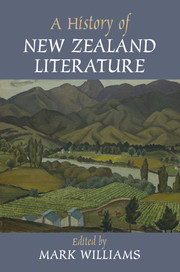Book contents
- Frontmatter
- Contents
- Notes on Contributors
- Acknowledgments
- Introduction
- PART I 1760–1920
- PART II 1920–1950
- PART III 1950–1972
- PART IV 1972–1990
- PART V 1990–2014
- 20 ‘While History Happens Elsewhere’: Fiction and Political Quietism, 1990–2014
- 21 Anecdote in Post-1990 New Zealand Poetry
- 22 From Exploring Identity to Facing the World: Drama Since 1990
- 23 From Meadow to Paddock: Children's and Young Adult Literature
- 24 ‘Nafanua and the New World’: Pasifika's Writing of Niu Zealand
- 25 New Zealand Literature in the Program Era, or, the Spirit of Nationalism Past
- Index
21 - Anecdote in Post-1990 New Zealand Poetry
from PART V - 1990–2014
Published online by Cambridge University Press: 05 April 2016
- Frontmatter
- Contents
- Notes on Contributors
- Acknowledgments
- Introduction
- PART I 1760–1920
- PART II 1920–1950
- PART III 1950–1972
- PART IV 1972–1990
- PART V 1990–2014
- 20 ‘While History Happens Elsewhere’: Fiction and Political Quietism, 1990–2014
- 21 Anecdote in Post-1990 New Zealand Poetry
- 22 From Exploring Identity to Facing the World: Drama Since 1990
- 23 From Meadow to Paddock: Children's and Young Adult Literature
- 24 ‘Nafanua and the New World’: Pasifika's Writing of Niu Zealand
- 25 New Zealand Literature in the Program Era, or, the Spirit of Nationalism Past
- Index
Summary
A comfortable consensus has evolved in critical descriptions of contemporary New Zealand poetry. It is a poetry that ‘overflow[s] with talk’. The speech it captures tends towards a conversational style, a straightforward diction, a fondness for the demotic. As Iain Sharp notes, ‘An unbuttoned, vernacular style of writing suits the sort of country we are’. Bill Manhire expands this definition to include a related characteristic – a vocal range with a commitment to moving between registers, to what he calls ‘code-switching’. New Zealand poetry is at its best, he implies, when it draws on ‘what All Black fans still call a touch of the mongrel’.
These accounts are certainly accurate in describing much contemporary New Zealand poetry, particularly that which has emerged since the 1990s. They capture the fundamental stylistic choices, but also the mood of New Zealand poetry. They are also, however, essentially descriptive. And, in an era of Internet-driven communication, where the local and the international become increasingly confluent, they are less useful in distinguishing New Zealand poetry from that of the rest of the English-speaking world, particularly those with similar colonial histories. This chapter argues that a different angle on contemporary New Zealand poetry might be gained by investigating these stylistic choices at the level of their formal and generic function. What are the forms that contemporary New Zealand poets find themselves most at home in? How have these changed in the last three decades? And what might this have to tell us about the specific and local pressures on our poetry?
C. K. Stead addressed the issue of form in his seminal lecture ‘From Wystan to Carlos: Modern and Modernism in Recent New Zealand Poetry’ (1981). Because New Zealand poets work in English, which is an international language with shared cultural associations, he argues, they should be read in the context of the broad tide of international literary history. If modernism's central philosophical gambit was to collapse the distinction between form and content, its corresponding technical innovation was the development (primarily through the work of T. S. Eliot and Ezra Pound) of a mimetic and organic ‘open form’ – lived experience harnessed in ‘radioactive fragments’ of linguistic energy. Accordingly, Stead assesses several New Zealand poets in light of their response to this formal shift.
- Type
- Chapter
- Information
- A History of New Zealand Literature , pp. 311 - 329Publisher: Cambridge University PressPrint publication year: 2016



